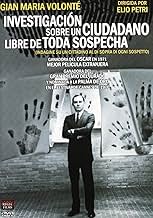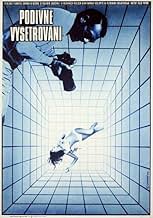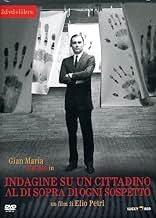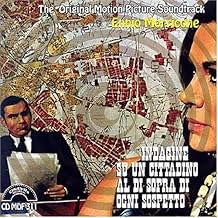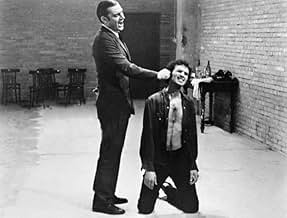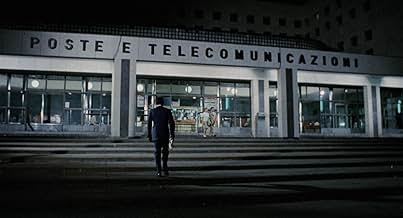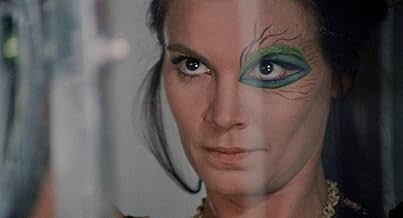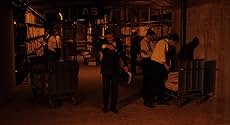Enquête sur un citoyen au-dessus de tout soupçon
A high-ranking policeman kills his sadomasochistic mistress and deliberately plants clues indicating his responsibility for the crime in a sardonic test to prove if he is above suspicion.A high-ranking policeman kills his sadomasochistic mistress and deliberately plants clues indicating his responsibility for the crime in a sardonic test to prove if he is above suspicion.A high-ranking policeman kills his sadomasochistic mistress and deliberately plants clues indicating his responsibility for the crime in a sardonic test to prove if he is above suspicion.
- Won 1 Oscar
- 16 wins & 6 nominations total
Featured reviews
A very original screenplay tells us the story of a respected police inspector who commits a crime and deliberately leaves clues just to find out how big is his reputation of "a citizen above suspicion" . The theme is developed from this single event and becomes an intelligent and provocative reflection about the concepts of authority and institution . While some could wrongly see this movie as a left-wing political one because of the way it depicts police authorities' excessive power , It is really only a fair illustration denouncing the impotence of institutions of making an impartial investigation about their own mistakes . The main theme of the movie rises up a brilliant and paradoxical question : how can the organs which administrate the "Law" condemn themselves without risking their own collapse and negation ? To this question the movie answers with the pessimistic vision that a real justice is an utopia because of human-beings' weaknesses and self-preservative nature . This brilliant reflection is developed in an highly entertaining and smoothly constructed satirical police-story : in fact the movie has an overwhelming "funny" tone especially thanks to Gian Maria Volonte' superb acting in the main role of the "fascistoid" police inspector . The ending will surprise you with the way it reveals the surrealistic nature of the whole topic .
Even if this movie was highly awarded and acclaimed at its time , (1 Oscar for Best foreign film , 1 Nomination for Best original screenplay , won Grand Prize of the Jury and Golden Palm nomination at Cannes Films Festival , 1 Golden globe nomination ) at the present days it has been criminally forgotten . I can only add that I personally consider it one of the best Italian films ever made and one of the most provocative police-stories in the last 40 years . Unfortunately it suffers of a very poor international distribution so , unless you live in Italy , it won't be easy for you to find this movie . But it doesn't matter how hard it will be , it will be worth it .
This movie is definitively about state violence. Even if to a viewer that has no foreknowledge of the police state that was instituted in Italy (with the help of the CIA as the movie alludes to) in order to keep the Communist Party from taking power (the PCI had the biggest following of any parties at that time), the fact remains that the movie is not much more surreal than the socio-political reality facing the film-maker.
Murders and "suicides" (while in police custody) of left-wing political activists and of anarchists are a fact that Elio Petri was painfully aware of. He made a documentary called "Streghi dello stato" "witches of the state" where Jean Maria Volonte and others expose such "suicides". Elio Petri was politically aware and through out his work there is criticism of the right wing of Italian politics (see TODO MORO).
I think that the movie is most powerful once you are aware of the fact that you can be victimized at the hands of an institution, esp. at the hands of an institution that exists only to maintain political order. Once the politicization of the priorities of those institutions that have the legitimate use of violence occurs, than meaningless violence towards the innocent will be allowed if punishing it would impair the political functions of the state machinery. Flora Balkan is perhaps a symbol for the masses, their love of violence and power, their love for the undoing of their freedoms.
A very fine movie that requires some effort, but that is always actual - thanks to an interesting narration of human nature. The movie does have it's flaws and i the action is not as invigorated as one expects it to be after the first 15 minutes, neither is the camera work at the level it has to be for this movie to be the greatest ever but it is still a hell of a great movie.
Whether or not you agree with this movie's negative portrayal of state violence and of that primal attraction that violence has (explored in a marvelously Mediterranean style in this movie) for so many could make the difference in how much you are puzzled by the movie. If you see it a a satire of power and violence - it might work.
I absolutely loved this film. It is part crime thriller, part detective story, and a bit of political corruption. Being Italian and having an Italian sensibility, it reminded me more than a little bit of the giallo film genre. But yet, it was distinct. The giallo is in some ways the precursor to the slasher, and this was not that sort of film -- not gory and the killer is not a masked and gloved man.
What really stands out is the score from Ennio Morricone. He has made many scores over the years and without exception they have been quite good. Is he the best composer of the 20th century? Maybe. And I would daresay this is among his very best, easily in the top three. The score alone makes the film worth watching.
The movie portrays the moral corruption of Italian police and politics in the 1970's, with totalitarian tactics wrapped in patriotism. The movie's lead policeman is swept up in the power of position. Sadly, it's only too easy for me to believe his ability to use his position and power to manipulate people and place himself above "the law".
The movie "looks" Italian and 1970's, with stark concrete and flat colors, which appealed to me. The story builds well, jumping backwards to fill in details, to climax in an alternate possible ending, very believable. I highly recommend it.
Did you know
- TriviaFirst part of the "Trilogy of Neurosis", also including La classe ouvrière va au paradis (1971) and La propriété, c'est plus le vol (1973).
- Quotes
Il Dottore - Former head of homicide squad: The people are underage, the city is sick. Others are tasked with educating and curing this. Our duty is to repress it! The repression is our vaccine! Repression and civilization!
- Crazy creditsBefore the end credits: "Whatever impression he makes on us, he is the servant of the Law. He belongs to the Law and is not answerable to human judgement..." Franz Kafka
- Alternate versionsThe subtitled American version distributed by Columbia has slight differences in the credits. The Italian version opens with blank white-on-black credits (as many other Petri films do). The American version projects the credits onto the opening scene with the Dottore walking around the street. Both the opening and the closing credits (including the film's title and the Kafka quotation) are translated to English as well.
- ConnectionsEdited into Colpiti al cuore (2019)
- How long is Investigation of a Citizen Above Suspicion?Powered by Alexa
Details
- Release date
- Country of origin
- Language
- Also known as
- Investigation of a Citizen Above Suspicion
- Filming locations
- Production company
- See more company credits at IMDbPro
Box office
- Gross US & Canada
- $265,470
- Runtime
- 1h 55m(115 min)
- Sound mix
- Aspect ratio
- 1.85 : 1



